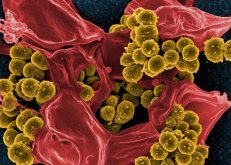Misplaced your keys? No worries, but if you forget what that shiny object is –that may be a sign of dementia.
Causes of dementia—dysfunction in memory or behavior—are many. The most feared, Alzheimer’s disease (AD) is also the most common perpetrator, affecting many millions across the globe. Briefly: AD aberrations include plaques and neurofibrillary tangles that are only observed on autopsy.
Indeed, scientists are working overtime trying to unravel this heartbreaking disease.
Researcher Pretorius from the University of Pretoria in South Africa along with colleagues in the United Kingdom published their excellent inquiry into the disease in the Journal of Alzheimer’s Disease recently.
- Importantly, iron dysregulation is a big component and microbes may be a missing link. Dormant bacteria may awaken when free iron circulates. These growing cells, say the authors, “can shed highly inflammatory components such as lipopolysaccharides (LPS). These too are known to be able to induce (apoptotic and pyroptotic) neuronal cell death.”
- Binding up iron could be one solution. The iron status of AD patients, as clinically assessed by serum ferritin levels, could be a relevant indicator.
The oxidative stress in these patients may be caused by more than one dysfunction:
- Mitochondrial changes
- Increased metal levels
- Inflammation
- Increased beta amyloids
All of these can lead to loss of synapses and neurons and cognitive decline.
How do microbes figure in dementia?
Toxic bacteria and resulting neuroinflammation can push the pileup of beta amyloids. Anything reducing that infectious stress or event, including antioxidants and a healthy defensive microbiome, may relieve it.
One recent study
60 AD patients were randomly divided into two groups treated with either milk (control group) or a mixture of probiotics (probiotic group). The probiotic-supplemented group took 200 ml/day probiotic milk containing Lactobacillus acidophilus, Lactobacillus casei, Bifidobacterium bifidum, and Lactobacillus fermentum (2 × 109 CFU/g for each) for 12 weeks.
Results showed that probiotic consumption for 12 weeks improved cognitive function and some metabolic statuses in the AD patients.
Thus tending to the microbiome could be another avenue to arresting or preventing AD. While research is minimal, it is a vital new area of research, one that those in the probiotic sphere will want to watch.
See also, from IPA:

